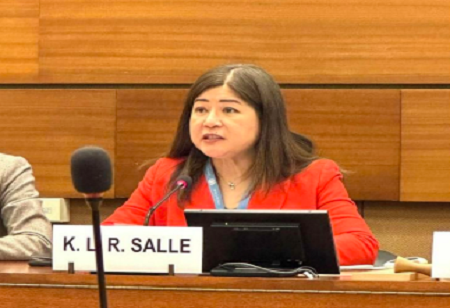The launch of the Fifth Phase (2025-2029) was led by Philippine Ambassador and Deputy Permanent Representative to the United Nations and other International Organizations in Geneva by Kristine Leilani R. Salle for the World Program of Human Rights Education. The event, held on the sidelines of the 58th session of the Human Rights Council in Geneva, featured a panel discussion titled “The Transformative Power of Human Rights Education in Achieving Gender Equality.” The occasion also served as a commemoration of International Women’s Day, which took place on March 8, 2025.
“Human rights education is our first line of defense against injustices, inequities, and violence that negate what are inherently and inalienably our rights, liberty, and dignity”, says Ambassador Salle in her opening remarks. Her remarks highlighted the necessity of integrating human rights education into both formal and informal educational systems to build a society that is just, equitable, and inclusive.
The human rights education and gender equality are key priorities for the Philippines both domestically and in its multilateral engagements was highlighted by Ambassador Salle. “We are pursuing a gender-responsive basic education policy to promote non-discrimination and the empowerment of the girl-child. Our independent Commission on Human Rights has partnered with universities to establish Centers for Human Rights Education across the country, we are equipping our next generation of leaders, policymakers, and professionals with the skills and tools to effectively integrate human rights into their work”, she added.
The Fifth Phase is aimed at children and youth, with a focus on the intersection of human rights and digital technologies, the environment and climate change, and gender equality. The Plan of Action for this phase was adopted by the UN Human Rights Council during its 57th Session in October 2025 through Resolution 57/10, which was introduced by the Philippines, Brazil, Costa Rica, Italy, Morocco, Senegal, Slovenia, and Thailand.
Joining Ambassador Salle on the panel were Ms. Nada Al-Nashif, Deputy High Commissioner for Human Rights at the United Nations; Simran and Ida, students from the International School of Geneva; Ms. Dejana Dexi Stosic, human rights educator and activist from Serbia; Ms. Božena Forštnarič Boroje, Director-General of the Directorate for Multilateral Cooperation at Slovenia’s Ministry of Foreign and European Affairs; Mr. Abdelghani Berdi, Head of the Technology, Digital Space, and Human Rights Division at Morocco’s National Human Rights Council (CNDH); and Ms. Mikiko Otani, a member and former Chairperson of the Committee on the Rights of the Child. Ms. Elena Ippoliti, coordinator of the OHCHR’s Human Rights Education Unit, moderated the discussion.
The event was organized by the Office of the United Nations High Commissioner for Human Rights (OHCHR), in partnership with the Core Group on Human Rights Education and Training, which includes the Philippines, Brazil, Costa Rica, Italy, Morocco, Senegal, Slovenia, and Thailand. The panel emphasized the urgent need to tackle systemic barriers that continue to impede the progress of women and girls globally, focusing on best practices, challenges, and opportunities in integrating human rights education into diverse educational frameworks to promote gender equality.

